Perlingeiro Lab
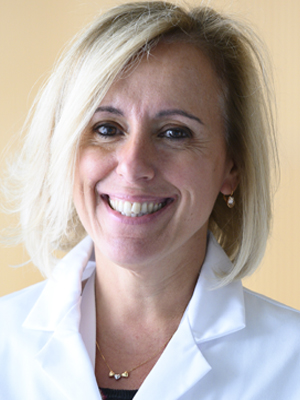
Our laboratory has a long-term interest in understanding the molecular mechanisms controlling lineage-specific differentiation of pluripotent stem cells (i.e. embryonic and adult reprogrammed stem cells), and applying this information to efficiently generate tissue-specific stem/progenitor cells endowed with in vivo regenerative potential. Our ultimate goal is to develop safe strategies to enable their future therapeutic application.
We are hiring!
| Seeking qualified postdoctoral candidates for research related to skeletal muscle regeneration and in vitro modeling using pluripotent stem cells. Work and train in a leading edge, active, fun environment for stem cell research. Contact Rita Perlingeiro for details: perli032@umn.edu. |
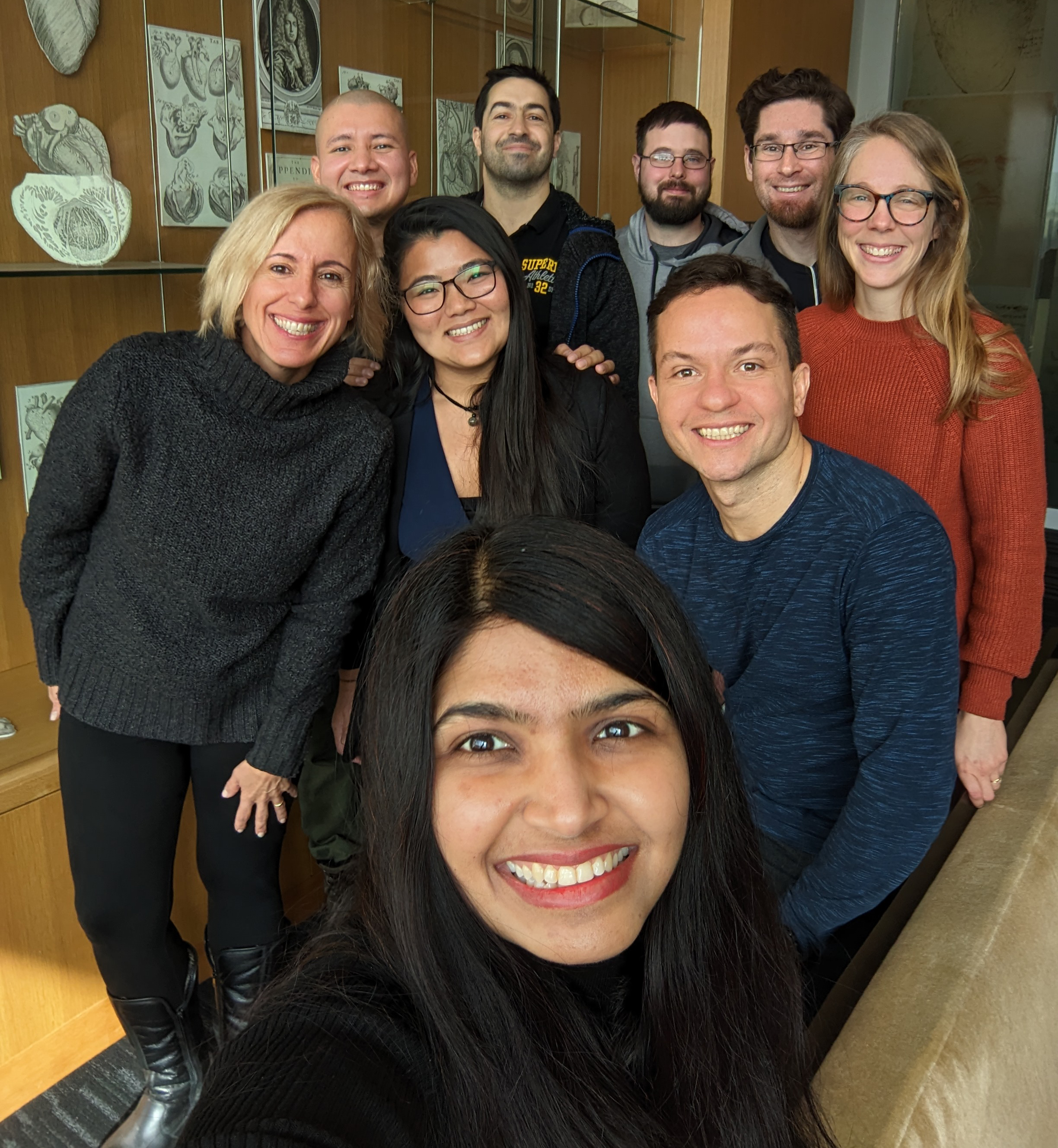
|
"NIH Awards $2.5m R01 Grant to Perlingeiro" (UMN Med School)
"Creating New Muscle by Using Stem Cells" (Duchenne UK)
"UMN Researchers Discover How Three-Dimensional Organization of the Genome Regulates Cell Differentiation" (UMN Med School)
"UMN Medical School Study Provides New Insight Into the Use of Cell Replacement Therapies to Treat Muscular Dystrophies" (UMN Med School)
"Feature Researcher: Rita Perlingeiro" (Stem Cell Institute)
"U Of M Makes Muscular Dystrophy Breakthrough" (WCCO video)
"U researchers use stem cells to regenerate muscles in diseased mice" (MN Public Radio)
"U of M researchers develop new muscular dystrophy treatment approach using human stem cells" (Science NewsLine)
"U of M researchers utilize genetically corrected stem cells to spark muscle regeneration"
Webinars, Podcasts, and Other Streaming Talks
Feb. 2023: Pluripotent Stem Cell Research and FSHD, FSHD Society, Zoom presentation
May 23, 2022: LGMD Global Advocacy Summit, Zoom presentation
April 2021: Muscular Dystrophy Research Day, Minneapolis, MN, Zoom presentation
Feb 21, 2021: “iPSC-Derived Myogenic Progenitors” (Culturing knowledge in stem cell research; Ep 141 Featuring Dr. Rita Perlingeiro)
Dec 21, 2020: Webinar on Muscle Regeneration, French FSHD Society, Zoom presentation
- Dissecting the molecular mechanisms controlling in vitro and in vivo maturation of PSC-derivatives
- Understanding how the muscle environment influences the engraftment of myogenic progenitors
- Preclinical studies of PSC-derived myogenic progenitors to enable clinical translation
- Disease modeling of DMD and BMD using patient-specific iPSC-derived skeletal and cardiac muscle cells
- Understanding the impact of HLA mismatch on muscle engraftment
Full list of publications at Experts@Minnesota or PubMed.
- Baik J, Ortiz-Cordero C, Magli A, Azzag K, Crist SB, Yamashita A, Kiley J, Selvaraj S, Mondragon-Gonzalez R. Perrin E, Maufort JP, Janecek JL, Lee RM, Stone LH, Rangarajan P, Ramachandran S, Graham ML, & Perlingeiro RCR. (2023). Establishment of skeletal myogenic progenitors from non-human primate induced pluripotent stem cells. Cells, 12(8), 1147; https://doi.org/10.3390/cells12081147.
- Singh BN, Yucel D, Garay BI, Tolkacheva EG, Kyba M, Perlingeiro RCR, van Berlo J, & Ogle BM, (2023) Proliferation and Maturation: Janus and the art of engineered cardiac tissue. Circulation Research, 132(4):519-540. PMCID: PMC9943541.
- McKenna DH & Perlingeiro RCR, (2023) Development of allogeneic iPS cell-based therapy: from bench to bedside. EMBO Molecular Medicine, 15(2):e15315. PMCID: PMC9906386.
- Azzag K, Bosnakovski D, Tungtur S, Salama P, Kyba M, & Perlingeiro RCR, (2022) Transplantation of pluripotent stem cell-derived myogenic progenitors counteracts disease phenotypes in a mouse model of FSHD. NPG Regenerative Medicine, 7(1):43. PMCID: PMC9440030.
- Garay BI, Givens S, Stanis N, Magli A, Yücel D, Abrahante JE, Goloviznina NA, Soliman HAN, Dhoke NR, Baik J, Kyba M, van Berlo JH, Ogle B, & Perlingeiro RCR, (2022) Inhibition of mitogen-activated protein kinase pathway enhances maturation of human iPSC-derived cardiomyocytes. Stem Cell Reports. 17(9):2005-2022. PMCID: PMC9481895.
- Kim H, & Perlingeiro RCR, (2022) Generation of human myogenic progenitors from pluripotent stem cells for in vivo regeneration. Cellular and Molecular Life Sciences. 8;79(8):406. doi: 10.1007/s00018-022-04434-8. PMCID: PMC9270264.
- Ortiz-Cordero C, Bincoletto, C, Dhoke N, Selvaraj S, Magli A, Zhou H, Kim D-H, Bang AG, & Perlingeiro RCR, (2021), Defective autophagy and increased apoptosis contribute toward the pathogenesis of FKRP-associated muscular dystrophies. Stem Cell Reports. 16(11):2752-2767. PMCID: PMC8581053.
- Dhoke N, Kim H, Selvaraj S, Oliveira NAJ, Azzag K, Tungtur S, Ortiz-Cordero C, Kiley J, Lu QL, Bang A, & Perlingeiro RCR, (2021), A universal gene correction approach for FKRP-associated dystroglycanopathies to enable autologous cell therapy. Cell Reports. 36(2):109360. PMCID: PMC8327854.
- Ortiz-Cordero C, Magli A, Dhoke N, Kuebler T, Selvaraj S, Oliveira NA, Zhou H, Sham YY, Bang AG, & Perlingeiro RCR, (2021), “NAD+ enhances ribitol and ribose rescue of α-dystroglycan functional glycosylation in human FKRP-mutant myotubes”. Elife, 2021 10:e65443. PMCID: PMC7924940
- Ortiz-Cordero C, Azzag K, & Perlingeiro RCR, (2021), “Fukutin-Related Protein: from Pathology to Treatments”. Trends in Cell Biology, 31:197-210. PMID: 33272829 (cover article).
- Kim H, Selvaraj S, Kiley J, Azzag K, Garay BI, & Perlingeiro RCR, (2021), “Genomic safe harbor expression of PAX7 for the generation of engraftable myogenic progenitors”. Stem Cell Reports, 16:10-19.PMCID: PMC7815936
- Baik J, Felices M, Yingst A, Theuer, CP, Verneris MR, Miller JS, & Perlingeiro RCR,(2020), “Therapeutic effect of TRC105 and decitabine combination in AML xenografts”. Heliyon, 6(10):e05242. PMCID: PMC7566100.
- Incitti T, Magli A, Jenkins J, Lin K, Yamamoto A and Perlingeiro RCR, (2020), “Pluripotent stem cell-derived skeletal muscle fibers preferentially express oxidative myosin heavy-chain isoforms: new implications for Duchenne Muscular Dystrophy”. Skeletal Muscle, 10(1):17. PMCID: PMC7268645
- Azzag K, Ortiz-Cordero C, Oliveira NAJ, Magli A, Selvaraj S, Tungtur S, Upchurch W, Iaizzo PA, Lu QL and Perlingeiro RCR, (2020) “Efficient Engraftment of Pluripotent Stem Cell-Derived Myogenic Progenitors in a Novel Immunodeficient Mouse Model of Limb Girdle Muscular Dystrophy 2I”. Skeletal Muscle, 10(1):10. PMCID: PMC7175515.
- Selvaraj S, Mondragon-Gonzalez R, Xu B, Magli A, Kim H, Lainé J, Kiley J, McKee H, Rinaldi F, Aho J, Tabti N, Shen W, & Perlingeiro RCR, (2019) “Screening identifies small molecules that enhance the maturation of human pluripotent stem cell-derived myotubes”. eLIFE, 8. pii: e47970. PMCID: PMC6845233.
- Selvaraj S, Dhoke N, Kiley J, Aierdi AJM, Mondragon-Gonzalez R, Killeen G, Oliveira VKP, Tungtur S, Munain AL & Perlingeiro RCR, (2019) “Gene Correction of Limb Girdle Muscular Dystrophy Type 2A Patient-Specific iPS Cells for the Development of Targeted Autologous Cell Therapy”. Molecular Therapy,27:2147-2157. PMCID: PMC6904833.
- Selvaraj S, Kyba M & Perlingeiro RCR, (2019) “Pluripotent Stem Cell-Based Therapeutics for Muscular Dystrophies” Trends in Molecular Medicine. 25:803-816. PMCID: PMC6721995. (cover article)
- Mondragon-Gonzalez R, Azzag K, Selvaraj S, Yamamoto A & Perlingeiro RCR, (2019) “Transplantation studies reveal internuclear transfer of toxic RNA in engrafted muscles of myotonic dystrophy 1 mice”. eBioMedicine. 47:553-562. PMCID: PMC6796515.
- Magli A, Baik J, Pota P, Ortiz Cordero C, Kwak IY, Garry DJ, Love PE, Dynlacht BD and Perlingeiro RCR, (2019) “Pax3 cooperates with Ldb1 to direct local chromosome architecture during myogenic lineage specification”. Nature Communications, 10:2316. PMCID: PMC6534668.
Full list of publications at Experts@Minnesota or PubMed.

Aaron Ahlquist
Position: Researcher
Joined the lab: October 2021
Education: 2017 BS, Biology, University of Minnesota
Research Interests: Muscular dystrophy and cardiology
Contact: ahlqu043@umn.edu
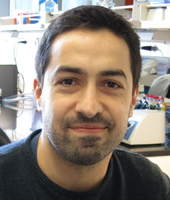
Karim Azzag, Ph.D.
Position: Researcher
Joined the lab: January 2018
Education: 2011 PhD, cellular biology, Montpellier II University
Research Interests: Molecular Mechanisms behind Cell Differentiation and iPSC-based cell therapy for muscular dystrophies
Accomplishments:
2022 - Abstract selected for oral presentation for the 2022 Stem Cell Institute Spring Conference: State of the Art Approaches for Cell, Tissue & Organ Transplantation.
2022 - Abstract selected for oral presentation for the 2022 29th annual FSHD society international research congress.
2022 - Abstract selected for oral presentation for the 2022 FASEB conference: The Skeletal Muscle Stem Cells and Regeneration Conference.
Contact: kazzag@umn.edu
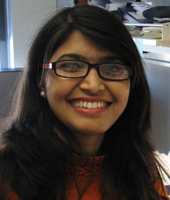
Neha Dhoke, Ph.D.
Position: Researcher
Joined the Lab: December 2017
Education: PhD 2017 Stem Cell Biology and Regenerative Medicine, CSIR-Indian Institute of Chemical Technology
Research Interests: Targeting dystroglycanopathies using pluripotent stem cell-derived myogeneic progenitors
Accomplishments:
2021 - Abstract for oral presentation accepted for 2021 CardioPalooza at the University of Minnesota
2020 - Abstract for oral presentation accepted for 2020 annual meeting of the American Society for Gene and Cell Therapy
Contact: ndhoke@umn.edu
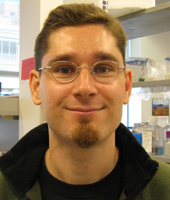
Jim Kiley
Position: Lab Manager, Researcher
Joined the Lab: April 2013
Education: 2004 BS – Biology – University of Minnesota
Research Interests: Cardiology and Muscular Dystrophy, previous research included vascular biology and sickle cell anemia
Contact: kile0003@umn.edu

Sarah Crist, Ph.D.
Position: Post-Doctoral Fellow
Joined the Lab: November 2021
Education:
2021 Ph.D. – Molecular and Cellular Biology – University of Washington/Fred Hutchinson CRC
2013 B.S. – Biology – Haverford College
Research Interests: Exploring the active role of the skeletal muscle microenvironment on iPax3 myogenic progenitor maturation, with particular interest in both endogenous extracellular matrix constituents and novel deposition by the transplanted myogenic progenitors.
Accomplishments:
2022 - Harold M. Weintraub Graduate Student Award
2022 - Recipient. T32 Training Program in Cardiac Innovation, NHLBI
2022 - University of Washington Graduate School's 2022 Distinguished Dissertation Award (category: Biological Sciences)
Contact: crist156@umn.edu
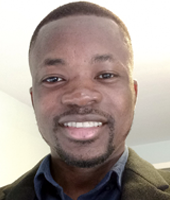
Fred Jonathan Edzeamey, Ph.D.
Position: Post-Doctoral Associate
Joined the Lab: January 2024
Education:
2023 Ph.D.-Biosciences Research, Brunel University London, United Kingdom
2020 MSc -Cancer Pharmacology, University of Bradford, United Kingdom
2017 BSc(Hons)- Human Biology, University of Cape Coast, Ghana
Research Interests: The therapeutic application of induced pluripotent stem cells (iPSCs) in different disease models.
Accomplishments: 2022: Recipient of Vice Chancellor’s Conference Award, Brunel University London
Contact: jedzeame@umn.edu

Muhammad Irfanur Rashid, Ph.D.
Position: Post-Doctoral Associate
Joined the Lab: August 2023
Education:
2023 Ph.D. – Molecular neurobiology and Stem Cell Biology – Aichi Medical University, Japan
Research Interests: My research focuses on induced pluripotent stem cells (iPSCs) and PSCs-derived models, particularly in the realms of skeletal muscle and neuromuscular systems. I aim to delve into the underlying mechanisms of neurodevelopmental and neurodegenerative disorders using iPSC/ PSC-derived models. Understanding both normal biological processes and how abnormalities in this system contribute to neurodegenerative conditions is at the core of my inquiry. Additionally, I'm keen on exploring skeletal muscle regeneration and in vitro modeling utilizing pluripotent stem cells, with a specific focus on iPSC-based cell therapy for muscular dystrophies.
Contact: rashi125@umn.edu
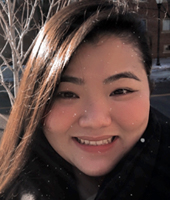
Aline Miyoko Sakaguchi Yamashita, Ph.D.
Position: Post-Doctoral Associate
Joined the Lab: February 2021
Education: 2019 PhD Biological Chemistry, Federal University of Rio de Janeiro
Research Interests: Molecular mechanisms during maturation of Pluripotent Stem Cell derived myogenic progenitors
Accomplishments: 2023 - Best Poster (postdoc category), Greg Marzolf, Jr. Symposium, University of Minnesota, April 1, 2023
Contact: sakag012@umn.edu
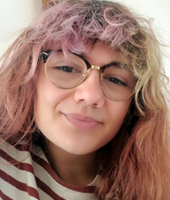
Estelle Giry
Position: Master Student
Joined the lab: January 2024
Education: 2022 B.S - Cellular Biology and Physiology - Paul Sabatier University
Expected graduation, June 2024, Master Degree, Neuroscience, Paris-Saclay University;
Research Interests: I'm interested in regenerative medicine and tools (cell therapy, gene therapy) to treat muscular dystrophies and motor diseases, and studying the regenerative capacities of stem cells for neurodegenerative diseases.
Contact: estelle.giry@hotmail.com
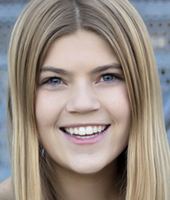
Annika Bijnagte
Position: Undergraduate
Joined the lab: September 2022
Education: Expected Graduation Date May 2026: B.S., Biology, University of Minnesota
Research Interests: Muscular Dystrophy, Stem cell therapy, and Cancer cells
Contact: bijna005@umn.edu
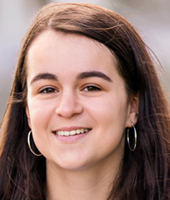
Ellison Rumbley
Position: Undergraduate
Joined the Lab: August 2023
Education: Expected Graduation Date May 2024: B.S. in Genetics, Cell Biology, and Development
Research Interests: Stem cell therapy and the molecular mechanisms behind stem cell differentiation, along with the use of computational biology in research settings.
Contact: rumbl017@umn.edu

Kendall Ziegler
Position: Undergraduate
Joined the lab: September 9, 2022
Education: Expected Graduation Date May 2026: B.S., Microbiology, University of Minnesota
Research Interests: Application of genome editing with CRISPR/Cas9
Contact: ziegl374@umn.edu